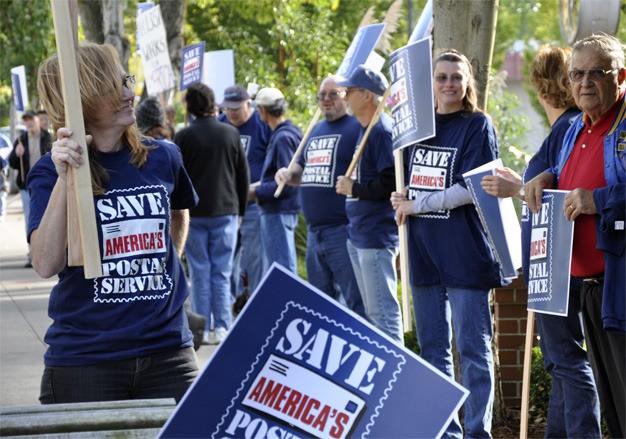They’ve been there for us since 1775, when Benjamin Franklin was appointed the first postmaster general. Through rain, sleet, snow or draught, letter carriers with the United States Postal Service have kept us connected to the outside world.
But this venerable institution is in trouble. On Tuesday postal workers representing four employee unions gathered in front of the home office of each member of the House of Representatives, to thank those members who have signed on as co-sponsors of H.R. 1351, and to encourage those who have not signed on as co-sponsors to do so. This included Rep. Dave Reichert’s office on Mercer Island. Reichert, a Republican, represents Washington’s eighth congressional district.
Patrick Pitts, the state steward for the National Rural Letter Carriers Association, said H.R. 1351 restructures funds. He said the Postal Service’s financial woes stem from a bill passed in Congress in 2006, requiring the Postal Service to pre-fund health care benefits for future retirees, people who haven’t even been born yet, he said, costing the USPS more than $5 billion a year.
“It appeared reasonable until the recession started,” Pitts said.
Called the “future retiree health benefit fund,” if Congress approves H.R. 1351, the money sitting in the fund could be used to fix the USPS’s financial issues, without costing taxpayers a dime. Pitts said current retirees are already funded. He said the office of the inspector general and the postal regulatory commission have issued reports that the Postal Service has in excess of $50 billion in the fund. 1351 allows the Postal Service to re-amortize the future retiree health benefits.
“If you took those billions of dollars out of the equation, the service would have made a net profit of over $600 million in the last four years,” Pitts said.
Pitts said numerous post offices in Washington have already closed, with thousands across the nation being studied for closure. But according to a recent article in the Washington Post, postmaster general Patrick R. Donahoe said, “Mail volume fell this year to only 167 billion pieces delivered, down 22 percent from four years ago, partly because Americans are paying bills online and sending electronic invitations instead of paper ones.”
Also present at the rally, at Reichert’s office, was Rick Horner of the National Association of Letter Carriers. He said members are opposed to stopping service on Saturday, one cost-cutting measure that has been proposed.
“It’s a slippery slope,” Horner said. “It would be a relatively small cost savings. They (advertisers) would (have to) find other means to send out their information, jeopardizing their businesses.”
Horner said house resolution 137 calls on Congress to maintain a six-day delivery.
Nancy Barnes of Renton, was at the rally in support of her husband, Noel, who she said was finishing up his route. Noel Barnes works out of the Kirkland office and has been with the Postal Service for 21 years.
Standing with Barnes was retired postal worker Gene Orcutt, who started with the Postal Service in 1957 working for $1.62 per hour. He retired from the Renton office in 1989. He said he was there to save the post office. “I like my retirement check,” Orcutt added. He worries that the federal government will view the future retiree health benefit fund as a cash cow they can apply somewhere else. According to rally organizers, the Postal Service hasn’t used a dime of taxpayer money in 30 years. All its revenue is earned from the sale of its products and services.




